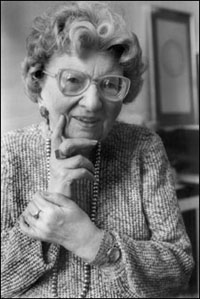Prolific Islamic scholar Schimmel dies

Annemarie Schimmel, Professor of Indo-Muslim Culture Emerita, died this past Sunday (Jan. 26) in Bonn, Germany, at the age of 80.
An outstanding and prolific scholar of Islam who was highly regarded both in the West and in the Muslim world, Schimmel routinely astonished students and colleagues with her command of languages, her profound knowledge of Islamic literature and culture, and her phenomenal memory. She was equally renowned for her kindness, humanity, and integrity.
“Annemarie was a truly exceptional person, the kind of individual who is so truly one of a kind that you know at once you will never see their like again,” said William Graham, the Albertson Professor of Middle Eastern Studies, professor of the history of religion, and dean of the Divinity School.
“Her legendary facility with writing and reading multiple languages vied with her encyclopedic memory, stunning productivity, and artistic sensibilities … as her most striking capability. These talents combined to make her a remarkably productive scholar of major sectors of the traditional Islamic world, from Morocco and Spain to South Asia.”
Ali Asani, professor of the practice of Indo-Muslim languages and cultures, said: “In Professor Schimmel’s passing, the world has lost an eminent scholar and extraordinary human being. She was my mentor during my undergraduate and graduate school days here at Harvard, and the memories now flood my mind of how kind, gentle, and caring she always was towards me and all those who knew her. All through the years, she remained ever-loyal and ever-generous to me and her many friends around the world. It is with sadness and profound gratitude that I reflect on this most gifted and distinguished of scholars and dearest of friends.”
Luis M. Giron-Negron, assistant professor of comparative literature and Romance languages and literatures, said, “I am heart-broken with the news of her passing. Her legendary status as a scholar pales beside the love and devotion she inspired among her grateful students. A mentor of deep humanity and integrity, she inculcated in us her great love for the spiritual treasures of Islam with generosity and wisdom. My debt of gratitude to her is boundless. She will be sorely missed.”
Born in the city of Erfurt in central Germany, Schimmel developed a fascination with Oriental languages at the age of 7, beginning the study of Arabic at 15. She earned a doctorate in Islamic languages and civilization from the University of Berlin at 19 and a second doctorate in the history of religions from the University of Marburg 10 years later.
Before coming to Harvard in 1967, she was professor of Arabic and Islamic studies at the University of Bonn. She traveled widely, spending five years in Turkey teaching (in Turkish) at the University of Ankara. She visited Pakistan numerous times, receiving three honorary degrees from Pakistani universities. In 1982, a tree-lined street in Lahore was named after her.
In 1970, she was named the first Professor of Indo-Muslim Culture, a chair endowed by A.K. Ozai Durrani, the inventor of Minute Rice. She retired from Harvard in 1992 and returned to Germany, accepting an honorary professorship from the University of Bonn.
Upon retirement from Harvard, she remarked that she had enough scholarly projects planned to keep her busy for the next 10 years. A check of the HOLLIS catalog shows that her retirement years were not idle ones. No fewer than 40 works appeared under her name between 1993 to the present, including an autobiography.
Schimmel maintained this level of productivity throughout her career. Graham remarked that “three new books published in a year was unremarkable for her, just as drafting an article in a few hours was commonplace.”
Diana Eck, Professor of Comparative Religion and Indian Studies, said: “She wrote prolifically and was always working on the manuscript of yet another project. I recall having lunch with her at Eliot House when I was a young faculty member and she told me she had been working that morning on the page proofs of a book she had forgotten she had written!”
Those who heard Schimmel lecture were invariably floored by her linguistic powers and her extraordinary memory.
“She was a brilliant scholar with a completely photographic memory,” said Eck. “She would often speak with her eyes closed, her lectures filled with recitations of Urdu or Persian poetry in the original and in translation and filled with the accession and death dates of every Indo-Muslim king she mentioned.”
In addition to translating works written in languages such as Persian, Urdu, Sindhi, Pashto, and Punjabi into both English and German, Schimmel was able to lecture in a wide variety of tongues. She once remarked that she could lecture unprepared and without notes in German, English, and Turkish, with notes in French, Arabic, and Persian, and from a manuscript in many other languages.
She was also an expert on Islamic civilization in South Asia, inaugurating a unique program in Indo-Muslim studies at Harvard. She had a great love for Islamic music and art, especially calligraphy, and published profusely on this subject. A scholar of great mystical and literary sensitivity, she also composed her own poetry in several languages, including German and English.
Schimmel also dedicated her life to fostering a better understanding of Islam and the Muslim world in the West. She served as an important bridge for interreligious and intercultural dialogue, a role that brought her much public recognition. In 1992, she received the Leopold Lucas Prize of the Evangelisch-Theologische Faculty of the University of Tübingen. The prize is given to persons who have striven to create better understanding among Christians, Jews, and Muslims. Schimmel was the first woman to win the award.
A memorial service is being planned for her at Harvard in the near future.




